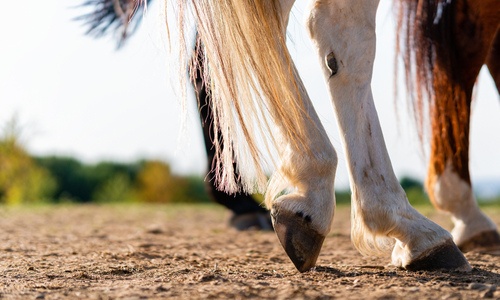
Hind Leg Problems in Horses
Could a hind leg issue cause lameness in your horse? The problems can affect horses of any age and could lead to permanent disability if they're not treated promptly.
Common Hind Leg Problems
Hind leg issues could be caused by:
- Wounds and Fractures. A cut, puncture wound, or broken bone could cause your horse to favor a hind leg. If cuts and wounds aren't treated promptly, an infection may complicate your horse's recovery. Although a quick visual examination of your horse's hind legs will help you spot cuts and infected sores, broken bones, or puncture wounds may not be so obvious.
- Stone Bruise. Have you ever experienced pain in your foot after stepping on a Lego or tiny toy? Called stone bruises, these injuries can also happen to your horse. You may see a red or purple spot on your horse's hoof or notice that it's walking a little gingerly. Stone bruises usually go away on their own in a few weeks.
- Arthritis. Arthritis, also called degenerative joint disease, can be age-related or may occur after an injury or infection. In horses, arthritis can cause pain, stiffness, and decreased range of motion, which may change your horse's gait.
- Laminitis. Although laminitis most often develops in the front feet, it can affect the back feet too. Laminitis occurs when blood flow is disrupted to the laminae that keep the coffin bone attached to the wall of the hoof. If laminitis isn't diagnosed and treated soon after symptoms develop, permanent damage could occur.
- Sprains and Strains. Overworking your horse when training can lead to muscles, ligaments, and tendon strains and sprains. Sprains or strains or more likely to occur if a horse changes speed abruptly or participates in an activity that involves sudden movements. Overgrown hooves may also increase the likelihood of a sprain or strain.
- Bursitis. Bursitis occurs due to inflammation in the fluid-filled sac that helps the muscles and tendons move smoothly over the bones in a joint. The condition causes pain, swelling, and stiffness and can be a result of an injury, infected puncture wound, a strain, or stress due to training.
- Pelvic Injuries. Dislocations, fractures, or ligament strains in your horse's pelvis could also be to blame for hind leg lameness. The injuries can happen to any horse, although performance horses have a higher risk.
- Spinal Cord Damage. If your horse wobbles when walking, spinal cord damage could be the culprit. The damage may be related to a fall, illness, infection, or malformed cervical vertebrae. Spinal cord damage affects the hind legs more often because the nerves that travel to those limbs are located outside of the spinal cord in the horse's neck and aren't as well protected as the front leg nerves, according to the American Association of Equine Practitioners.
Warning Signs of Hind Leg Problems
It's not always easy to spot hind leg issues, particularly if they're mild. If your horse has an injury or condition that affects one or both hind legs, you may notice a few of these signs:
- A gait change
- Flaccid tail
- Reluctance to put weight on the injured leg
- Frequent shifting of weight to the toe, heel, or outside part of the hoof
- Swelling around a joint
- Inability to stand
- Wounds or deformed joints
- Trouble stopping smoothly
- Difficulty with transitions or picking up a lead
- Shorter steps on the affected leg
- Unusual head or neck position
- Trouble walking downhill
- More up-and-down movement in one hip when walking or trotting
Do any of these signs sound familiar? We can diagnose the cause of your horse's hind leg problem and recommend a treatment plan. Get in touch with our office to schedule a visit.
Sources:
American College of Veterinary Surgeons: Laminitis in Horses
The Horse: Problems in the Horse’s Hips and Pelvis, 3/1/19
My Horse University: Lameness in the Horse: An Owner's Overview
American Association of Equine Practitioners: Is He Lame or Is He Neurologic? (Wobbler Syndrome)
